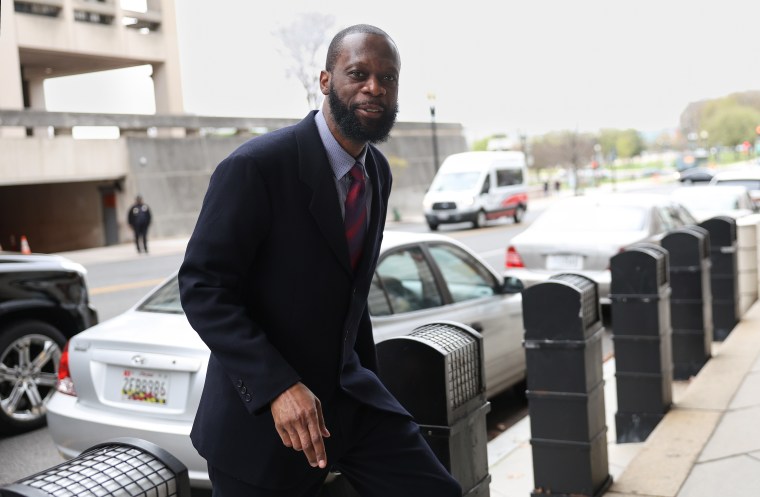 Pras Michel. Photo by Kevin Dietsch/Getty Images.
Pras Michel. Photo by Kevin Dietsch/Getty Images.
Attorneys for Fugees co-founder Prakazrel Michel (Pras) filed a motion on Monday, October 16 for the Washington, D.C. District Court to grant him a new trial, Meghan Cuniff reports and additional documents reviewed by The FADER confirm. Michel was convicted in April of 10 federal offenses, including conspiracy, campaign finance violations, money laundering, illegal lobbying, and witness tampering. If the conviction stands, he faces a maximum sentence of 20 years in prison.
The new motion — signed by Michel’s current attorney Peter Zeidenberg (as well as his associates Michael F. Dearington, David M. Tafuri, and Sarah “Cissy” Jackson) — is based on two main complaints: actions by the court that prejudiced the jury and incompetence by Michel’s former defense attorney, David Kenner. (Kenner also worked on the defense team of Daystar Peterson, aka Tory Lanez, who was sentenced in August to 10 years in prison for shooting his ex-girlfriend Megan Pete, aka Megan Thee Stallion, in the foot.)
In summary, Zeidenberg et al. allege that U.S. District Court Judge Colleen Kollar-Kotelly, who oversaw the trial, made prejudicial statements — and allowed the prosecution to introduce prejudicial testimony — that unduly influenced the jury to convict Michel.
The motion goes into much further detail about Kenner’s generally “ineffective” counsel and his own prejudicial statements that allegedly backfired on Michel. Part of this ineffectiveness, Zeidenberg argues, was due to his use of the “experimental AI program” EyeLevel to help him write his closing argument to the jury.
“Kenner generated his closing argument — perhaps the single most important portion of any jury trial — using a proprietary prototype AI program in which he and Alon Israely appear to have had an undisclosed financial stake,” Zeidenberg writes. “Far from hiding this fact, Kenner boasted about it after Michel was convicted, stating; ‘The system turned hours or days of legal work into seconds.’
“The AI company touted it as the first use of ‘generative AI in a federal trial,’” the motion continues. “It showed. Kenner’s closing argument made frivolous arguments, misapprehended the required elements, conflated the schemes, and ignored critical weaknesses in the Government’s case. The closing was damaging to the defense.”
In a footnote, Zeidenberg cited EyeLevel’s triumphant update on the “First Use of AI in Federal Trial,” which attributes the following statement to Kenner: “This is an absolute game changer for complex litigation. The system turned hours or days of legal work into seconds. This is a look into the future of how cases will be conducted.”
When reached for comment on the allegation of Kenner’s “undisclosed financial stake” in the company, Zeidenberg declined to comment, writing, “Our briefs lay out our positions.” Kenner did not immediately respond to The FADER’s request for comment.
The case against Michel stemmed from his involvement with Low Taek Jho (aka Jho Low), a Hollywood party fixture and one-time advisor to former Malaysian president Najib Razak. Together, Low and Michel were accused of funneling federal funds to political campaigns and obstructing the investigation into their alleged crimes. Low is still at large — believed by Malaysian authorities government to be in hiding in Macau — and wanted internationally in connection with his country’s 1MDB scandal, in which he allegedly helped embezzle billions of dollars from the state-owned sovereign investment fund he and then-president Razak co-founded.
Federal prosecutors said Low gave Pras approximately $100 million over the years in an attempt to influence U.S. politics: In 2012, they claimed, Pras used some of that money to illegally contribute to Political Action Committees (PACs) supporting Barack Obama’s reelection campaign. Later, the prosecutors said, he used more of the funds in an attempt to pressure the Trump administration to terminate a Department of Justice investigation into Low’s activities. He was also accused of another attempt to sway Trump’s office, this time on behalf of the Chinese government — advocating for the extradition of a Chinese dissident from the States — without registering as a foreign agent.
During Michel’s first trial, Kenner explained his dealings with Jho as part of his early efforts to enter the political arena after Fugees disbanded, insisting that there had been “no agreement to do anything in an unlawful way.” Another key contention of Zeidenberg’s motion is that this line of argument compromised Michel’s case by essentially accepting the overall frame of the prosecution’s charges.


